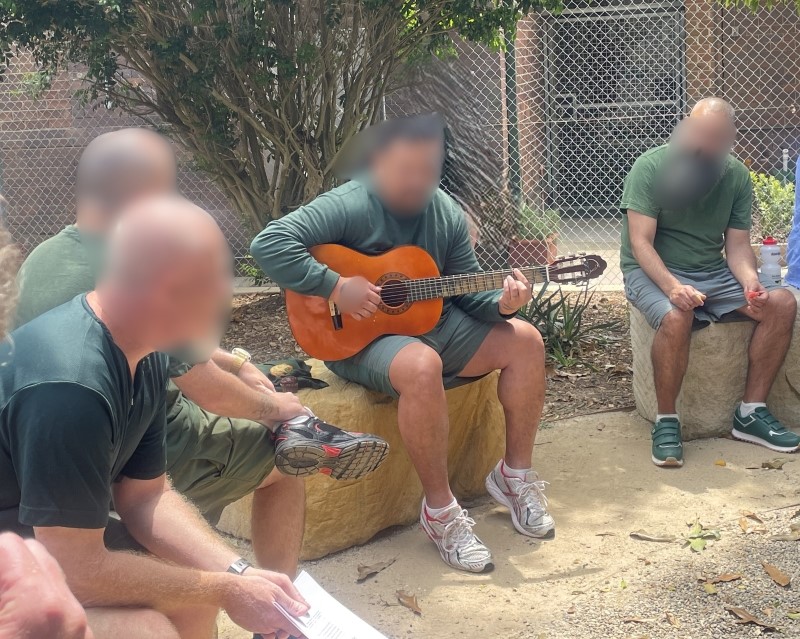Automatic language translation
Our website uses an automatic service to translate our content into different languages. These translations should be used as a guide only. See our Accessibility page for further information.
17 NOVEMBER 2025
Inmates in NSW correctional centres are supported by a range of professionals who work to keep them safe, healthy and focused on reintegration - including correctional officers, services and program officers, case managers and health workers. Now they can meet with Harm Reduction Peers as well.
In a joint initiative, Corrective Services NSW and Justice Health NSW have introduced Harm Reduction Peers (HRPs). These are inmates who’ve been trained to use their own lived experience to talk with others about drug and alcohol use. They offer advice on how to reduce harm and help fellow inmates learn about and access support services and programs.

HRPs provide practical advice to reduce the risks associated with drug use and blood-borne viruses, encouraging safer choices among inmates. A key goal of the program is to eliminate Hepatitis C in custody by 2028. Achieving this would not only protect the health of inmates but also lower the chances of the virus spreading in the community after release.
Like other inmate jobs, HRPs are paid for their work. They take part in training that covers health, harm reduction and peer support, giving them the skills to connect others with the right services and resources. By sharing their experience in a positive way, HRPs help break down stigma and encourage safer behaviours which can make a difference both inside prison and beyond.
“I want to be a role model, to make my children not see me as a problem. If I can help save one person, I will feel blessed,” says Jonah*.
“I had problems with drugs when I was young, and I see myself in a lot of the younger ones when they come in here. I can talk to them, and they can see that if I have changed, so can they.”

Jonah* and his fellow HRPs undertook comprehensive training in harm reduction principles, overdose awareness, blood-borne viruses, stigma and discrimination, peer work, confidentiality and how to share lived experience in a safe way.
The training took place over seven weeks, run by Justice Health NSW, and included a follow up session four weeks post-training. Justice Health NSW and Corrective Services NSW also provide ongoing support to all HRPs.
The HRPs aren’t just helping others, they’re building skills for themselves too. The training and everyday experience in communication, mentoring and health promotion are giving them tools they can carry into life after custody. Whether they choose to work in health or community services, they’re gaining confidence and experience that could help them make a fresh start.
“I enjoyed the training a lot, coming in and having discussions, I’ve learned a few things from the other boys, and I’ve come from the course thinking this will really work,” says Stan*.
“I had someone take me under his wing when I first came in, he told me to stop the rubbish, to stop trying to be a gangster, and it made a massive difference. Now I’d like to be able to do that for someone. I’d like to talk to people, they know they can trust me, I’m not going to run around and tell everyone their business – none of us (HRPs) will do that. “
The five HRPS at the Metropolitan Special Programs Centre at Long Bay Correctional Complex were presented with a ‘uniform’ at the completion of their training, making them easily identifiable in the yard.

Stan is proud to wear the HRP shirt he received and is happy it makes him visible as one of the men other inmates can approach.
“I’ve already had people come up to me and ask me questions about safety and I can see we are making a difference.”
Stan’s experience reflects how the HRP program is making a difference inside the centre, helping inmates connect with each other and understand how and why to make safer choices. But the impact of the program goes beyond individual stories, it’s changing the way inmates experience care and support in the prison system.

“It’s been really rewarding to see how much the peer workers bring to this program,” said Gary Gahan, Manager of Harm Reduction Projects at Justice Health NSW.
“They’re using their own experience to help others make safer choices and to build a stronger sense of community inside. In doing that, they’re helping make the prison environment safer for everyone, staff and patients alike. It shows what’s possible when we value lived experience as a key part of health care in custody.”
*Names of inmates have been changed.
Last updated:
We acknowledge Aboriginal people as the First Nations Peoples of NSW and pay our respects to Elders past, present, and future.
Informed by lessons of the past, Department of Communities and Justice is improving how we work with Aboriginal people and communities. We listen and learn from the knowledge, strength and resilience of Stolen Generations Survivors, Aboriginal Elders and Aboriginal communities.
You can access our apology to the Stolen Generations.